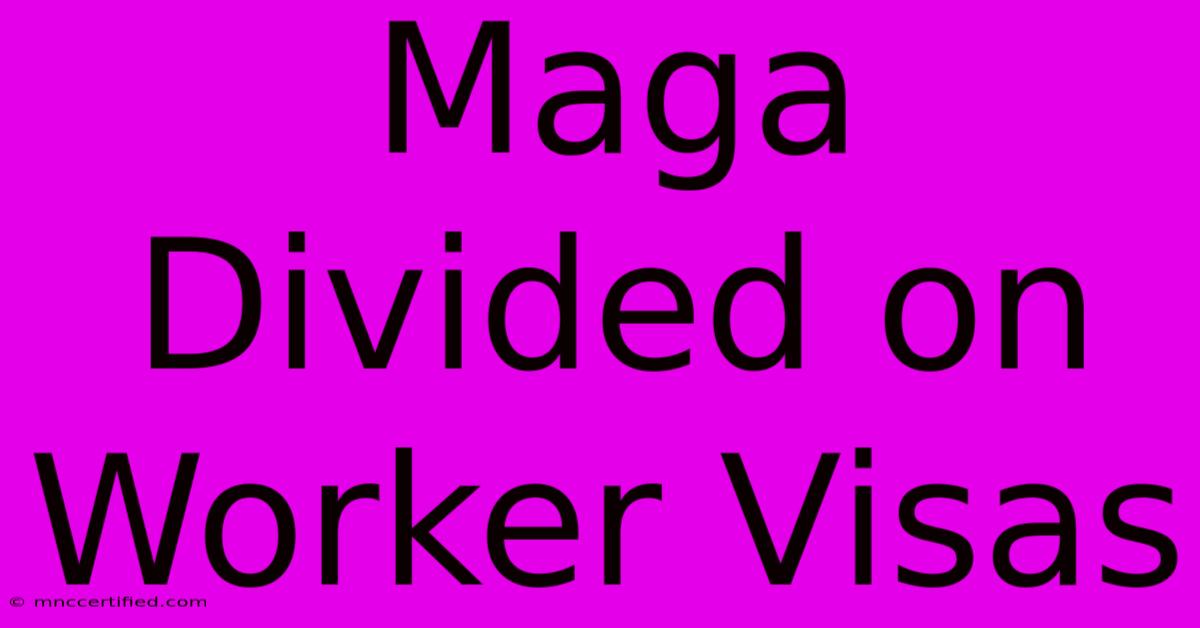Maga Divided On Worker Visas

Table of Contents
MAGA Divided on Worker Visas: A Deep Dive into the Internal Conflict
The "Make America Great Again" (MAGA) movement, a significant force in American politics, finds itself surprisingly fractured on the issue of worker visas. While a core tenet of MAGA often centers on prioritizing American workers, the reality is far more nuanced, revealing a complex internal debate on the role of immigration, particularly in the context of filling labor shortages across various sectors. This article delves into the divisions within the MAGA movement regarding worker visas, exploring the arguments from both sides and analyzing the potential consequences of these conflicting viewpoints.
The Pro-Worker Visa Argument Within MAGA: Addressing Labor Shortages
A segment of the MAGA movement recognizes the critical role that worker visas play in addressing significant labor shortages across the US economy. Proponents argue that restricting visas excessively could negatively impact vital sectors such as agriculture, technology, and healthcare. They point to specific examples where businesses struggle to find qualified American workers to fill crucial roles, leading to production delays, increased costs, and ultimately, a less competitive American economy. These individuals often emphasize the following points:
- Economic Necessity: Worker visas, they contend, fill essential skill gaps, boosting productivity and economic growth. Restricting them would harm industries struggling to find enough skilled workers.
- Targeted Immigration: The focus should be on attracting highly skilled workers who can contribute significantly to the American economy, rather than implementing blanket bans. A merit-based system, they suggest, would benefit both businesses and the nation as a whole.
- Maintaining Competitiveness: Restricting legal immigration could hinder America's ability to compete globally in various industries, leading to a decline in innovation and economic influence.
The Anti-Worker Visa Argument Within MAGA: Protecting American Jobs
Conversely, a substantial portion of the MAGA movement staunchly opposes expanding worker visas, arguing that they depress wages for American workers and displace native-born citizens from employment opportunities. This faction prioritizes "putting Americans first" and views worker visas as a threat to domestic job security. Key arguments include:
- Wage Depression: They believe that an influx of foreign workers, even those on temporary visas, can drive down wages, especially for low-skilled workers, hurting the financial well-being of American families.
- Job Displacement: Concerns exist that businesses might prefer hiring visa holders, who may be willing to accept lower wages or work longer hours, displacing American workers.
- Enforcement Concerns: Some express doubt about the government's ability to effectively enforce visa regulations, leading to concerns about potential abuse of the system and exploitation of foreign workers.
The Internal Conflict and its Political Ramifications
This internal conflict within the MAGA movement has significant political ramifications. The debate highlights the tension between economic realities and the core ideological principles of prioritizing American workers. This internal struggle is reflected in the inconsistent messaging coming from various MAGA figures and within the Republican party itself, creating ambiguity and complicating policy discussions surrounding immigration reform.
Navigating the Divide: Potential Solutions
Finding common ground requires acknowledging the valid concerns on both sides. A potential compromise could involve implementing stricter regulations to prevent abuse, focusing on attracting highly skilled workers in areas of critical need, and strengthening enforcement mechanisms to protect American workers from exploitation. This approach would require a careful balancing act, aiming to address labor shortages without undermining the interests of American workers.
Conclusion: A Complex Issue Demands Careful Consideration
The MAGA movement's divided stance on worker visas reveals a complex and multifaceted issue that deserves thorough consideration. Simply choosing one side ignores the economic realities and the legitimate concerns of both proponents and opponents. Moving forward, constructive dialogue and comprehensive solutions are crucial to finding a path that fosters economic growth while ensuring fair treatment and opportunities for American workers. The future of this debate will significantly shape the direction of immigration policy in the United States.
Keywords: MAGA, worker visas, immigration, labor shortages, American workers, economic growth, job displacement, wage depression, immigration reform, political divisions, Republican party, skilled labor, merit-based immigration, visa regulations.

Thank you for visiting our website wich cover about Maga Divided On Worker Visas. We hope the information provided has been useful to you. Feel free to contact us if you have any questions or need further assistance. See you next time and dont miss to bookmark.
Featured Posts
-
Arsenal Ipswich Live Match Score Updates
Dec 28, 2024
-
Syracuses 2025 Football Season
Dec 28, 2024
-
Deceased Nk Soldier In Ukraine Report
Dec 28, 2024
-
Anita Rani Marriage Break Dark Truth
Dec 28, 2024
-
Starmer Mourns Brothers Boxing Day Death
Dec 28, 2024